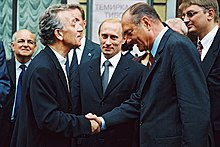Yuri Temirkanov


Yuri Khatuevich Temirkanov (Russian: Ю́рий Хату́евич Темирка́нов; Kabardian: Темыркъан Хьэту и къуэ Юрий; born December 10, 1938) is a Russian conductor[1] of Circassian (Kabardian) origin.
Temirkanov has been the Music Director and Chief Conductor of the St. Petersburg Philharmonic since 1988.[2][3]
Early life[]
Born in 1938 in the North Caucasus city of Nalchik, Temirkanov began his musical studies at the age of nine. When he was thirteen, he attended the Leningrad School for Talented Children where he continued his studies in violin and viola. After graduating, he attended the Leningrad Conservatory as a viola major. He returned to the Conservatory to study conducting with Ilya Musin, and graduated in 1965.
Career[]
After winning the All-Soviet National Conducting Competition in 1966, Temirkanov was invited by Kirill Kondrashin to tour Europe and the United States with violinist David Oistrakh and the Moscow Philharmonic Orchestra. Temirkanov made his debut with the Leningrad Philharmonic in early 1967, and was then invited to join the orchestra as Assistant Conductor to Yevgeny Mravinsky. In 1968, he was appointed Principal Conductor of the then-renamed Leningrad Symphony where he remained until his appointment as Music Director of the Kirov Opera and Ballet in 1976.
Temirkanov is a frequent guest conductor for the leading orchestras of Europe, Asia and the United States. He was the first Soviet artist permitted to perform in the United States after cultural relations were resumed with the Soviet Union at the end of the Soviet–Afghan War in 1988.
In addition to leading the St. Petersburg Philharmonic, Temirkanov was the Baltimore Symphony Orchestra's 11th Music Director from 2000 until 2006 and is currently the Principal Guest Conductor of the Danish National Symphony Orchestra and Conductor Laureate of the Royal Philharmonic Orchestra in London.[4] In 2015 he was assigned by Teatro La Fenice the prize A Life for Music, unofficially known as the Nobel Prize for Musicians.[5]
Honors and awards[]
- A life for music (2015), Teatro La Fenice, Venice
- Order of Merit for the Fatherland;
- 1st class (9 December 2008) – for outstanding contributions to the development of domestic and world music, many years of creative activity
- 2nd class (10 December 2003) – for outstanding contribution to music
- 3rd class (1998)
- 4th class (10 December 2013)
- Order of Lenin (1983)
- Order of Saints Cyril and Methodius (Bulgaria, 1998)
- People's Artist of the USSR (1981)
- People's Artist of the RSFSR (1976)
- People's Artist of Kabardino-Balkar Autonomous Soviet Socialist Republic (1973)
- State Prize of the Russian Federation in Literature and Art in 1998 (4 June 1999) – for concert programs 1995–1998 Academic Symphony Orchestra, St. Petersburg Philharmonic Society named after Shostakovich
- Russian Federation President Prize in Literature and Art in 2002 (13 February 2003)
- USSR State Prizes;
- 1976 – for conducting opera "Peter the First" by A. Petrov
- 1985 – for conducting and staging opera "Eugene Onegin" by Tchaikovsky on stage LATOB Kirov
- Glinka State Prize of the RSFSR (1971) – for the years 1968–1970 concert programs
- Award "Triumph" (2003)
- Tsarskoselskaya Art Prize (2002)
- Order of Science and Culture, "Catherine the Great" (2002)
- Honorary citizen of St. Petersburg (2009)
- Abbiati Prize "Best Conductor of the Year" (2003, 2007)
- Badge of Honour "For Services to the Republic of Kabardino-Balkaria" (2008)
- Order "For Service to the St. Petersburg" (2008)
- DaCapo KlassiK Award "Conductor of the Year" (2013)
- The 6432 Temirkanov asteroid was named after the conductor (1975)
 Order of the Rising Sun, 3rd Class, Gold Rays with Neck Ribbon (2015)
Order of the Rising Sun, 3rd Class, Gold Rays with Neck Ribbon (2015)
Controversy[]
Temirkanov has drawn attention for saying that women are essentially weak and thus not well suited to be classical conductors.[6] In 2016, he said, "Yes, women can be conductors. I am not against them conducting. But I simply don't like it."[7]
References[]
- ^ "Yuri Temirkanov Named Music Director Of Teatro Regio di Parma". Opera Chic. 13 June 2008. Retrieved 16 January 2019.
- ^ "Yuri Temirkanov". Retrieved 16 January 2019.
- ^ "Yuri Temirkanov". Saint-Petersburg Philharmonia. 2007. Retrieved 16 January 2019.
- ^ "Yuri Temirkanov Music Director Emeritus, Baltimore Symphony Orchestra". Baltimore Symphony Orchestra. 2007. Retrieved 29 January 2010.
- ^ "Russian conductor wins 'Nobel Prize' for musicians". Russia Beyond the Headlines. 7 April 2015. Retrieved 16 January 2019.
- ^ "Women, Gays and Classical Music". The New Yorker. 3 October 2013. Retrieved 16 January 2019.
- ^ "Settling the Score: Women Conductors Talk About the Slow Road to Equality". Billboard. 2019-12-09. Retrieved 2020-08-31.
External links[]
- Interview with Yuri Temirkanov, July 17, 1997
- 1938 births
- Living people
- People from Nalchik
- Circassian people of Russia
- Male conductors (music)
- Russian classical violists
- Recipients of the Order "For Merit to the Fatherland", 1st class
- Recipients of the Order "For Merit to the Fatherland", 2nd class
- Recipients of the Order "For Merit to the Fatherland", 3rd class
- Recipients of the Order of Lenin
- People's Artists of the USSR
- People's Artists of Russia
- State Prize of the Russian Federation laureates
- Recipients of the USSR State Prize
- Glinka State Prize of the RSFSR winners
- Soviet conductors (music)
- 20th-century Russian conductors (music)
- 20th-century Russian male musicians
- 20th-century classical musicians
- 21st-century Russian conductors (music)
- 21st-century Russian male musicians